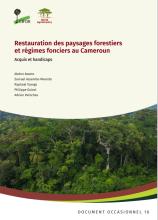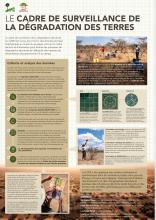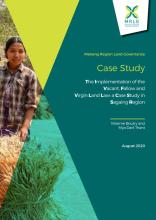Land Library
Bienvenue dans la bibliothèque du Land Portal. Explorez notre vaste collection de ressources en libre accès (plus de 74 000), comprenant des rapports, des articles scientifiques, des articles de recherche, des publications évaluées par des pairs, des documents juridiques, des vidéos et bien plus encore.
/ library resources
Showing items 1 through 9 of 37.Ce papier constitue une synthèse des acquis et des handicaps de la restauration des paysages forestiers et régimes fonciers au Cameroun.
Le cadre de surveillance de la dégradation des terres (ou LDSF) est conçu pour fournir des données de base biophysiques au niveau du paysage, ainsi qu’un cadre de suivi et d’évaluation pour évaluer les processus de dégradation des terres et l’efficacité des mesures de réhabilitation (récupération
This Case Study looks at the implementation of the Vacant, Fallow and Virgin Lands Management Law (VFV Law) in seven villages in Sagaing Region, to assess the practices on the ground and how the law impacts the land tenure security of smallholder farmers.
The Mekong Region Land Governance (MRLG) project, MLIKE (Mekong Land Information and Knowledge Exchange), and the Land Portal co-facilitated an online dialogue on “Responsible Large Scale Agricultural Investments in the Mekong Region” on 09-27 October 2017.
Rubber prices in northern Laos have fallen significantly over the last few years, eroding much of the initial enthusiasm of both farmers and government officials about rubber providing a way out of poverty for poor upland farmers.
In the Mekong region, conflicts between local communities and large scale land concessions are widespread. They are often difficult to solve.
The NGO Forum on Cambodia, in cooperation with the Ministry of Agriculture, Forests and Fisheries, organized a national consultation workshop on 19-20 December 2016 on the sixth version of the draft Cambodian Agricultural Land Law.
This dialogue provided a way for the land community to collaboratively explore challenges and opportunities related to the recognition of indigenous, ethnic minority and customary tenure rights in the Mekong region in order to:









